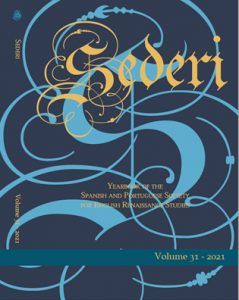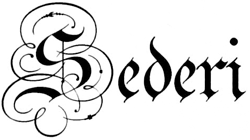
Sederi 30
Sederi 31 — 2021
EDITOR
Ana Sáez-Hidalgo
MANAGING EDITORS
Marta Cerezo Moreno
Isabel Guerrero Llorente
REVIEW EDITOR
Miguel Ramalhete
ISSN 1135-7789
Alison Shell, “Priestly playwright, secular priest: William Drury’s Latin and English drama.” SEDERI 31 (2021): 117–145.
DOI: https://doi.org/10.34136/sederi.2021.6 Download PDF
Abstract
This article examines the literary career of the secular priest William Drury, with an emphasis on his drama. The Latin plays which he wrote for performance at the English College in Douai are among the best-known English Catholic college dramas of the Stuart era; markedly different from the Jesuit drama which dominates the corpus of British Catholic college plays, they suggest conscious dissociation from that imaginative tradition. Hierarchomachia: or the Anti-Bishop, a satirical closet drama which intervenes in the controversy surrounding the legitimacy and extent of England’s Catholic episcopacy, can also be attributed to Drury. In both his Latin and English drama, Drury draws imaginative stimulus from his ideological opposition to Jesuits and other regulars. Yet his characteristic blend of didacticism and comedy, and his sympathy for the plight of all English Catholics—surely fomented by the death of his Jesuit brother in the notorious “Fatal Vesper”—point to broader priestly concerns.
Keywords: William Drury; Robert Drury; Chalcedon controversy; Catholic college drama; English College; Douai.
References
Primary sources
Manuscript sources
London: Archives of the Archdiocese of Westminster.
MS AAW, A XXIII, no. 41, 105. “Ex litteris scriptis.”
Oxford: Worcester College. MS 4.
Printed sources
Anon. 1623. Something written by occasion of that fatall and memorable accident in the Blacke Friers. London: s.n.
Anon. 1626. The historie of Frier Rush. London: Edward Allde.
Burton, Edwin H., and Thomas L. Williams, eds. 1911. The Douay College Diaries. Third, Fourth and Fifth, 1598–1654, 2 vols. London: Catholic Record Society.
Drury, William. 1620. Aluredus, sive Alfredus. […] Mors, comoedia. […] De venerabili eucharistia. Douai: Joannes Bogardus.
Drury, William. 1628. Dramatica poemata. Douai: P[etrus?] Bogardus.
Drury, William. 1641. Dramatica poemata. Antwerp: Petrus Bellerus.
Drury, William. 2014. Aluredus sive Alfredus. Mors comoedia. Reparatus sive Depositum. Edited by Dana Sutton. University of Birmingham. Accessed July 25, 2021. http://www.philological.bham.ac.uk/alf/.
Drury, William. See also Gossett, Suzanne ed.; Hall, Edgar Albert, ed.; Knightley, Robert, trans.; Siconolfi, Michael Thomas, ed.
Ely, Humphrey. 1602. Certaine briefe notes. Paris: Peter Sevestre.
Everard, John. 1611. Britanno-Romanus. London: William Hall for William Welbie.
Featley, Daniel. 1623. The Fisher catched in his owne net. London: s.n.
Fuller, Thomas. (1655) 1970. Church-history of Britain. Edited by J.S. Brewer. 6 vols. Farnborough: Gregg.
Gossett, Suzanne, ed. 1982. Hierarchomachia or The Anti-Bishop. London and Toronto: Bucknell University Press / Associated University Presses.
Hacket, John. 1988. Loiola. Edited by Malcolm M. Brennan. Hildesheim: Olms.
Hall, Edgar Albert, ed. 1918. “William Drury’s Aluredus sive Alfredus, A Latin College Play Edited with Introduction, Marginal Translation, and Notes; To Which Are Added Synopses and Discussion of the Same Author’s Mors and Reparatus.” 2 vols. PhD thesis, The University of Chicago.
Holmes, P. J. 1987. Review of Suzanne Gossett, ed., Hierarchomachia or the Anti-Bishop. The English Historical Review 102, no. 402: 211–212.
Knightley, Robert, trans. 1993. Robert Knightley, Alfrede or Right Reinthron’d, A Translation of William Drury’s Aluredus sive Alfredus. Edited by Albert H. Tricomi. Binghamton, NY: Medieval and Renaissance Texts and Studies.
Pavur, Claude, ed. and trans. 2005. The Ratio Studiorum: The Official Plan for Jesuit Education. St Louis: Institute of Jesuit Sources.
Roper, William. 1962. “The Life of Sir Thomas More (c. 1557).” In Two Early Tudor Lives. Edited by Richard S. Sylvester and Davis P. Harding. New Haven: Yale University Press.
Rowley, William. 1638. A merrie and pleasant comedy […] called A shoo-maker a gentleman. London: J[ohn] Okes.
Siconolfi, Michael Thomas, ed. 1982. “Robert Squire’s Death, a Comedie, A Seventeenth Century Translation of William Drury’s Mors: A Critical Edition.” PhD thesis, Syracuse University.
Squire, Robert. See Siconolfi, Michael Thomas.
Stefonio, Bernardino. 1655. S. Symphorosa Tragoedia. Rome: Ignatio de Lazzeris.
Tricomi 1993. See Knightley, Robert, trans. 1993.
Secondary sources
Anstruther, Godfrey. 1975. The Seminary Priests: A Directory of the Secular Clergy of England and Wales, 1558–1850. 2. Early Stuarts, 1603–1659. Great Wakering: Mayhew-McCrimmon.
Bald, R.C. 1959. Donne and the Drurys. Cambridge: Cambridge University Press.
Bayley, Peter. 1990. “Braggadocchio.” In The Spenser Encyclopaedia, general editor A.C. Hamilton, 286–287. Toronto and London: University of Toronto Press / Routledge.
Blundell, Mark, Dora Thornton, Peter Davidson and Jane Stevenson. 2018. “The Harkirk Graveyard and William Blundell ‘the Recusant’ (1560–1638): A Reconsideration.” British Catholic History 34, no. 1: 29–76.
Butler, Todd. 2012. “Equivocation, Cognition and Political Authority in Early Modern England.” Texas Studies in Literature and Language 54, no. 1: 132–154.
Chapman, Alison. 2001. “Whose Saint Crispin’s Day Is It?: Shoemaking, Holiday Making, and the Politics of Memory in Early Modern England.” Renaissance Quarterly 54, no. 4, Part 2: 1467–1494.
Cooper, Thompson and G. Bradley. 2004. “Drury, Robert (c. 1588–1623), Jesuit.” Oxford Dictionary of National Biography. Accessed 29 Aug. 2021. https://doi.org/10.1093/ref:odnb/8099.
Cooper, Thompson, and Ross Kennedy. 2004. «Drury, William (bap. 1584, d. in or after 1643), Latin playwright.» Oxford Dictionary of National Biography. Accessed 29 Aug. 2021. https://doi.org/10.1093/ref:odnb/8103.
Cottegnies, Line. 2017. “The Saint-Omer Folio in its Library.” Cahiers Élisabéthains 93, no. 1: 13–32.
Cottegnies, Line. 2019. “Shakespeare Anthologized: Taking a Fresh Look at Douai Manuscript MS787.” Actes des congrès de la Société française Shakespeare 37: s.n. Accessed July 25, 2021. https://doi.org/10.4000/ shakespeare.4289.
Cox, John D. 2000. The Devil and the Sacred in English Drama, 1350–1642. Cambridge: Cambridge University Press.
Davidson, Alan, and Tina Davidson. 1971. “Edward Benlowes and the Blackfriars Disaster.” Essex Recusant 13, no. 1: 46–47.
Dutton, Richard. 2000. “Jonson’s Satiric Styles.” In The Cambridge Companion to Ben Jonson, edited by Richard Harp and Stanley Stewart, 58–71. Cambridge: Cambridge University Press.
Ford, Philip, and Andrew Taylor, eds. 2013. The Early Modern Cultures of Neo-Latin Drama. Leuven: Leuven University Press.
Freeman, Arthur. 1966. “William Drury, Dramatist.” Recusant History (now British Catholic History) 8, no. 5: 293–297.
Hamilton, Donna B. 1999. “Richard Verstegan’s A Restitution of Decayed Intelligence (1605): A Catholic Antiquarian Replies to John Foxe, Thomas Cooper, and Jean Bodin.” Prose Studies 22, no. 1: 1–38.
Haskell, Yasmin A. 2003. Loyola’s Bees: Ideology and Industry in Jesuit Latin Didactic Poetry. Oxford: Oxford University Press / British Academy.
Herbrüggen, Hubertus Schulte. 1991. “La Danse macabre, the English Dance of Death and William Drury’s Mors comoedia.” In Acta Conventus Neo-Latini Torontonensis (Proceedings of the Seventh International Congress of Neo-Latin Studies). Edited by Alexander Dalzell, Charles Fantazzi, and Richard J. Schoeck, 645–653. New York: Center for Medieval and Early Renaissance Studies, State University of New York at Binghamton.
Holmes, Peter. 2004. “Drury, Robert (1567–1607), Roman Catholic priest.” Oxford Dictionary of National Biography. Accessed 29 Aug. 2021. https://doi.org/10.1093/ref:odnb/8098
Houliston, Victor. 1993. “Breuis dialogismus.” English Literary Renaissance 23, no. 3: 382–427.
Lake, Peter, and Michael Questier. 2019. All Hail to the Archpriest: Confessional Conflict, Toleration, and the Politics of Publicity in Post- Reformation England. Oxford: Oxford University Press.
McCabe, William H. 1983. An Introduction to the Jesuit Theater. Edited by Louis J. Oldani. St Louis, MO.: Institute of Jesuit Sources.
McCoog, Thomas M. 2017. The Society of Jesus in Ireland, Scotland and England, 1598–1606. Leiden: Brill.
Milward, Peter. 2004. “Kellison, Matthew (1561–1642), Roman Catholic priest.” Oxford Dictionary of National Biography. Accessed 29 Aug. 2021. https://doi.org/10.1093/ref:odnb/15290.
Miola, Robert S. 1994. Shakespeare and Classical Comedy: The Influence of Plautus and Terence. Oxford: Clarendon Press.
Miola, Robert S. 2019. “Roman Comedy in Early Modern England.” In The Cambridge Companion to Roman Comedy, edited by Martin T. Dinter, 312–324. Cambridge: Cambridge University Press.
Norland, Howard B. 2013. “Neo-Latin Drama in Britain.” In Neo-Latin Drama and Theatre in Early Modern Europe, edited by Jan Bloemendal and Howard B. Norland, 471–544. Leiden: Brill.
Mullaney, Steven. 1980. “Lying Like Truth: Riddle, Representation and Treason in Renaissance England.” English Literary History 47, no. 1: 32–47.
Oates, J.C.T. 1986. Cambridge University Library: A History. Cambridge: Cambridge University Press.
Oberman, Heiko. 1988. “Teufelsdreck: Eschatology and Scatology in the ‘Old’ Luther.” Sixteenth Century Journal 19, no. 3: 435–450.
Patterson, Annabel. 1984. Censorship and Interpretation: The Conditions of Writing and Reading in Early Modern England. Madison: Wisconsin University Press.
Potter, Lois. 1989. Secret Rites and Secret Writing: Royalist Literature, 1641–1660. Cambridge: Cambridge University Press.
Preedy, Chloe. 2014. “Performance and the ‘Holy Purse’: Ben Jonson’s Attack on Puritan Value(s).” Renaissance Drama 42, no. 2: 217–242.
Proot, Goran. 2013. “Mors comoedia. A Comedy a Hundred Years Old Brought to Life Again in 1726.” The Collation (Folger Shakespeare Library online journal). Accessed July 25, 2021.
https://collation.folger.edu/2013/04/mors-comoedia-a-comedy-a-hundred-years-old-brought-to-life-again-in-1726/.
Questier, Michael C. 1997. “Loyalty, Religion and State Power in Early Modern England: English Romanism and the Jacobean Oath of Allegiance.” Historical Journal 40, no. 2: 311–329.
Questier, Michael C., ed. 2005. Newsletters from the Caroline Court, 1631–1638: Catholicism and the Politics of the Personal Rule. London: Cambridge University Press for Royal Historical Society.
Quint, David. 1993. Epic and Empire: Politics and Generic Form from Virgil to Milton. Princeton: Princeton University Press.
Renner, Bernd. 2014. “From Satura to Satyre: François Rabelais and the Renaissance Appropriation of a Genre.” Renaissance Quarterly 67, no. 2: 377–424.
Rodda, Joshua. 2014. Public Religious Disputation in England, 1558–1626. Farnham: Ashgate.
Rowe, Joy. 2004. “Drury family (per. 1485–1624), gentry.” Oxford Dictionary of National Biography. Accessed 29 Aug. 2021. https://doi.org/10.1093/ref: odnb/73909
Semper, I.J. 1952. “The Jacobean Theater through the Eyes of Catholic Clerics.” Shakespeare Quarterly 3, no. 1: 45–51.
Shell, Alison. 2016. “Byzantine Tragedy in Restoration England: Joseph Simons’s Zeno and Sir William Killigrew’s The Imperial Tragedy.” Renaissance Studies 30, no. 4: 623–639.
Southgate, Beverley. 2004. “White [alias Blacklo], Thomas (1592/3–1676), Roman Catholic priest and philosopher.” Oxford Dictionary of National Biography. Accessed 29 Aug. 2021. https://doi.org/10.1093/ref:odnb/ 29274.
Underwood, Lucy. 2014. Childhood, Youth and Religious Dissent in Post-Reformation England. Basingstoke: Palgrave Macmillan.
Underwood, Lucy. 2021. “Representing England in Rome: Sermons from the Early Modern English College to Popes and Cardinals.” Reformation and Renaissance Review 23, no. 1: 4–26.
Wadkins, Timothy. 2004. «Percy [alias Fisher], John (1569–1641), Jesuit.» Oxford Dictionary of National Biography. Accessed 29 Aug. 2021. https://doi.org/10.1093/ref:odnb/9499.
Walsham, Alexandra. 1994. “‘The Fatall Vesper’: Providentialism and Anti-Popery in Late Jacobean London.” Past and Present 144: 36–87.
Walsham, Alexandra. 2014. Catholic Reformation in Protestant Britain. Farnham: Ashgate.
Wiggins, Martin, with Catherine Richardson. 2012–. British Drama, 1533–1642: A Catalogue. 9 vols to date. Oxford: Oxford University Press.
Winniczuk, Lidia. 1968. “Humour in Jesuit School Drama and the Roman Comedy.” In Antiquitas Graeco-Romana ac Tempora Nostra: Acta congressus internationalis habiti Brunae diebus 12–16 mensis Aprilis MCMLXVI, edited by Jan Burian and Ladislav Vidman, 301–311. Prague: Academia.
Witmore, Michael. 2001. Culture of Accidents: Unexpected Knowledges in Early Modern England. Stanford: Stanford University Press.
Yearling, Rebecca. 2016. Ben Jonson, John Marston and Early Modern Drama. Basingstoke: Palgrave Macmillan.
